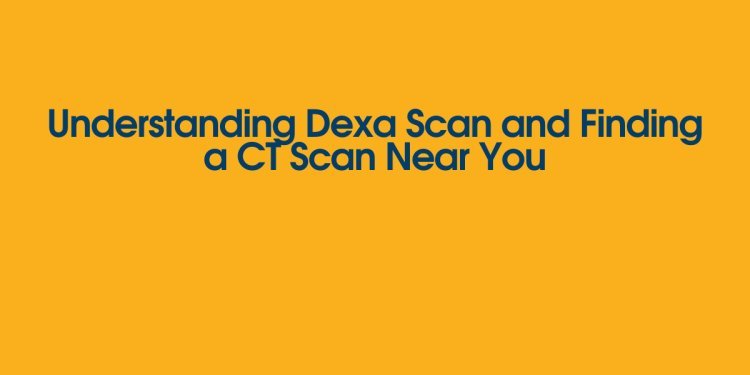In the world of medical diagnostics, technological advancements have revolutionized the way healthcare professionals assess and treat various conditions. Two commonly used imaging techniques, Dexa Scan and CT Scan, play crucial roles in diagnosing different medical issues, ranging from bone density to internal organ abnormalities. Understanding what these scans entail and knowing where to find them is vital for individuals seeking accurate diagnoses and effective treatment plans.
Dexa Scan: Assessing Bone Health
Dexa Scan, short for Dual-Energy X-ray Absorptiometry, is a non-invasive imaging technique primarily used to measure bone mineral density (BMD). It is the gold standard for diagnosing osteoporosis, a condition characterized by weakened bones prone to fractures. Dexa Scan helps healthcare providers assess an individual's risk of fractures and monitor the effectiveness of osteoporosis treatment.
During a Dexa Scan, the patient lies comfortably on a table while a machine emits low-dose X-rays, typically targeting the spine and hip bones. The scan takes only a few minutes and is painless. Dexa Scan results provide a T-score, which compares the patient's BMD to that of a healthy young adult. A T-score of -1 and above is considered normal, while scores between -1 and -2.5 indicate osteopenia (low bone density) and scores of -2.5 and below suggest osteoporosis.
Regular Dexa Scans are recommended for postmenopausal women, individuals with risk factors for osteoporosis (such as prolonged steroid use or family history of fractures), and those undergoing treatment for the condition.
CT Scan: Versatile Imaging for Detailed Diagnosis
Contrastingly, a CT (Computed Tomography) Scan utilizes X-rays to create detailed cross-sectional images of the body. It is valuable for diagnosing a wide range of medical conditions, including cancer, cardiovascular disease, and trauma. CT Scans provide detailed images of bones, organs, blood vessels, and soft tissues, aiding in accurate diagnosis and treatment planning.
During a CT Scan, the patient may be required to lie on a table that moves through a doughnut-shaped machine. X-ray beams rotate around the body, capturing multiple images from different angles. A computer then processes these images to generate detailed cross-sectional views that can be viewed by a radiologist.
The versatility of CT Scans makes them indispensable tools in modern medicine. They are commonly used in emergency departments to assess injuries, in oncology for tumor staging, and in neurology for detecting abnormalities in the brain.
Locating a facility offering CT Scans is relatively straightforward, given their widespread availability in hospitals and imaging centers. Most healthcare providers can refer patients to facilities equipped with CT scanners. Additionally, many online platforms and healthcare apps allow individuals to search for nearby medical facilities and book appointments for CT Scans.
When seeking a CT Scan, it's essential to consider factors such as the facility's reputation, the qualifications of the radiology team, and the availability of the latest imaging technology. Patient comfort and safety should always be prioritized, and facilities adhering to strict quality control measures and radiation safety protocols are preferable.
In conclusion, Dexa Scan and CT Scan are invaluable tools in modern medicine, offering clinicians detailed insights into bone health and internal anatomy, respectively. Whether assessing bone density or diagnosing complex medical conditions, these imaging techniques contribute significantly to accurate diagnoses and effective treatment plans. Knowing where to find these scans and understanding their importance can empower individuals to take proactive steps towards maintaining their health and well-being.














![Wireless Connectivity Software Market Size, Share | Statistics [2032]](https://handyclassified.com/uploads/images/202404/image_100x75_661f3be896033.jpg)



